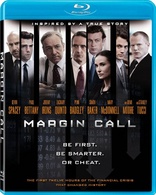Margin Call Blu-ray Movie
HomeMargin Call Blu-ray Movie 
Lionsgate Films | 2011 | 107 min | Rated R | Dec 20, 2011Movie rating
7.2 | / 10 |
Blu-ray rating
| Users | 3.7 | |
| Reviewer | 4.0 | |
| Overall | 3.7 |
Overview
Margin Call (2011)
Follows the key people at an investment bank over a 24-hour period during the early stages of the 2008 financial crisis.
Starring: Kevin Spacey, Paul Bettany, Jeremy Irons, Zachary Quinto, Penn BadgleyDirector: J.C. Chandor
| Drama | Uncertain |
| Psychological thriller | Uncertain |
| Thriller | Uncertain |
Specifications
Video
Video codec: MPEG-4 AVC
Video resolution: 1080p
Aspect ratio: 1.78:1
Original aspect ratio: 1.85:1
Audio
English: DTS-HD Master Audio 5.1 (48kHz, 24-bit)
Subtitles
English, English SDH, Spanish
Discs
25GB Blu-ray Disc
Single disc (1 BD)
Playback
Region A (locked)
Review
Rating summary
| Movie | 3.5 | |
| Video | 4.0 | |
| Audio | 4.5 | |
| Extras | 2.0 | |
| Overall | 4.0 |
Margin Call Blu-ray Movie Review
Is greed still good?
Reviewed by Jeffrey Kauffman December 16, 2011Will young people and kids in 2080 or 2090 wonder if the Great Financial Meltdown of the last few years was really as bad as their grandparents (today’s twenty-somethings) make it out to be? There are fewer and fewer people around today who lived through the Great Depression of the late 1920s through the 1930s, but for those of us who grew up remembering our grandparents’ (or even parents’) memories, it was hard to square away stories of soup lines and apple carts with what were supremely confident and prosperous times of the 1960s, 1970s and 1980s. The past few years have seen a dramatic shift in consciousness for a lot of people who once assumed that their finances would be more or less secure (despite the risk of the stock market) and that employment was a given. There’s still probably a disconnect for a lot of people, as we live in a high tech society where 24 hour cable news, smart phones, and, yes, even high definition make everything seem shiny and sleek, and so it may be hard to process the fact that while there aren’t grainy black and white newsreels of destitute homeless people standing in lines for a scrap of food, or iconic black and white photographs of Grapes of Wrath-esque farmers leaving the Dust Bowl for supposed greener pastures out West, we’re still in a time of horrible economic calamity for huge numbers of the world’s population. That same disconnect is part and parcel of the fascinating Margin Call, a sort of financial thriller that proves that even the Big Kahunas of investment banks sometimes don’t fully understand the technical intricacies of what they’re doing, and who because of that ignorance, proceed blithely into the “bliss” of destroying working partnerships and the lives of innocent “civilians” in their quest for the almighty dollar.

Virtually everyone with a stock portfolio or 401K or some other significant interest earning investments has seen their net worth take a precipitous dive over the past few years, and most of us have felt completely helpless to affect our financial outcomes in any significant way. How could a calamity this far reaching have ever happened? Margin Call tries — not completely successfully, it should be pointed out—to explicate the genesis of what most of us have experienced over the past few years, by depicting the sudden call to arms at a major New York City investment bank when the algorithm they’ve used to successfully profit from questionable mortgages is shown to be leading them all over a cliff from which the firm doesn’t have sufficient market capitalization to recover. Margin Call’s conceit in this portrayal is its emphasis on how most of the upper management, while perhaps vaguely (or even more than vaguely) aware of the general outlines of the problem, don’t have the technical (meaning math) skills to really comprehend the nuts and bolts of the situation, with a sort of mantra of “Explain it as you’d explain it to a child” being repeated by a number of those faced with their own professional ruin.
Margin Call begins with a virtual invasion of stony faced officials into a busy high rise office. Will Emerson (Paul Bettany) advises Peter Sullivan (Zachary Quinto, who also co-produced) and Seth Bregman (Penn Badgley) to keep their heads down and get back to work. Is this an SEC investigation? No, it’s something perhaps even more horrifying—a mass layoff which is going to seriously rout the forces at the firm. Among those let go is Eric Dale (Stanley Tucci), who passes a flash drive to Peter as he is escorted out of the office and tells him to “Be careful.” Peter stays late after work that night and begins going over the files Eric has given to him, quickly discovering that the firm is on the precipice of disaster, and in fact trading has already exceeded dangerous risk levels for the past two weeks. He has Seth track down Will, both of whom have left for an evening of heavy drinking, and they return to the corporate fold to look over the figures.
Within mere moments (something never adequately explained, since this is already in the dead of night), a coterie of firm executives has descended on the offices to figure out what the appropriate course of action should be. These include upper management types like the haggard Sam Rogers (Kevin Spacey), an older man with 34 years at the firm who just had to give a pep talk to the few remaining employees after the morning’s bloodbath. Also trying to stem the tide are Jared Cohen (Simon Baker) and Sarah Robertson (Demi Moore), whose hushed conversations with each make it clear they had at least some idea that this crisis was approaching. Soon, corporate head honcho John Tuld (Jeremy Irons) descends from above in a helicopter, a corporate Deus ex machine, to rally his troops and find a way out of the crisis.
What we’re left with, then, is a group of amazing performers giving top notch performances, and that indeed may be enough to carry most in the audience along. Spacey is winning a lot of kudos for his work here, but the fact is this is an awfully understated piece that gives the actor precious little to exploit, other than an overall sense of ennui and regret, something which Spacey’s doleful eyes and sad countenance bring out effortlessly. Much more showy, but not cartoonish in any way, is Irons’ turn as the sort of Rupert Murdoch-esque Big Kahuna who freely admits that brains had nothing to do with him getting where he is. His ruthlessness is perfectly evinced by Irons’ clipped manner and it’s this portrayal which will probably stick with viewers the most indelibly.
Chandor is an incredibly talented writer-director and the fact that he was able to assemble such a mind boggling cast for his first feature film is a testament to his prodigious abilities. If there are still missteps (a late in the film montage sequence with Moore is just plain silly, especially when her hairstyle changes repeatedly over the course of just a few seconds), Margin Call benefits from a very viscerally real feeling. If nothing is ever adequately explained, maybe that’s because a calamity of this size and impact is at its core inexplicable.
Margin Call Blu-ray Movie, Video Quality 

Margin Call is presented on Blu-ray courtesy of Lionsgate Films with an AVC encoded 1080p transfer in 1.78:1. This is yet another Red Camera-filmed outing, and as is typical with these efforts, there's a shiny smooth texture to the film that some may find hard to get used to. More troubling from a purely aesthetic angle is the sometimes surprisingly soft looking transfer here, one which is distinctly at odds with Red's usually crisp, clear imagery. The softness is almost always limited to midrange shots, as close-ups (and a lot of this film plays out in close-ups) still feature excellent fine detail. The film has been filtered occasionally, with blues highlighted, so that contrast is less distinct than it would be in "normal" conditions. Overall the film sports decent black levels and an appealing, if not especially robust, palette.
Margin Call Blu-ray Movie, Audio Quality 

Margin Call's lossless DTS-HD Master Audio 5.1 mix isn't overtly showy, but it's often very, very effective. While the bulk of the film plays out in quiet, if intense, dialogue scenes that are offered across a fairly narrow soundstage, there are several nice added elements here that open up the spaciousness of the track and help to create a suitably urban environment. On the trading floor itself, when everyone is in full tilt boogie mode, voices careen around the soundfield, and in a couple of exterior sequences, the full panoply of the sounds of New York City populate the surrounds, creating a nice sense of immersion. Fidelity is top notch here, and while dynamic range is somewhat subdued, the Blu-ray delivers a consistent and enjoyable sonic experience.
Margin Call Blu-ray Movie, Special Features and Extras 

- Director and Producer Commentary features J.C. Chandor and Neal Dodson. Chandor is a first time writer- director and also proves to be an informative commentator, giving background on such technical data as locations and filming techniques as well as insight into the actors' performance styles. I personally would have appreciated a little more insight into information about the actual financial underpinnings of the film.
- Deleted Scenes (1080i; 4:31) with Optional Commentary by Director and Producer. There's nothing earth shattering here, but it's interesting stuff, including a cut scene featuring Meryl Streep's youngest daughter Grace Gummer in a scene with Zachary Quinto.
- Revolving Door: Making Margin Call (1080i; 5:58) is a fairly interesting background piece with cast and crew interviews. There's some good background on the script nuances here, especially for those who aren't particularly well acquainted with the world of high finance.
- Missed Calls: Momnts with Cast and Crew (HD; 1:06) is a standard gag reel.
- From the Deck: Photo Gallery (1080i; 3:41)
Margin Call Blu-ray Movie, Overall Score and Recommendation 

Margin Call boasts one of the most impressive ensemble casts in recent memory, and all of the actors are at the top of their game, albeit within the buttoned down confines of the world of high finance. What the film really could have benefited from is a clear, concise explanation of exactly what is going on. The financial misdealings here are treated almost like a "McGuffin", a supposedly tangential and ultimately meaningless plot point utilized to propel the action along, but when so much of Margin Call's coherence depends on understanding those dealings, it's contraindicated not to clearly explain the shenanigans. If you can get past that aspect, which can deprive the film of some of its impact, there are some incredible performances here. The Blu-ray offers nice (if sometimes soft) looking video and solid audio, and it comes Recommended.
Similar titles
Similar titles you might also like

Black Sea
2014

127 Hours
2010

The Ides of March
2011

All Is Lost
2013

The Insider
1999

The Reluctant Fundamentalist
2013

Parkland
2013

Steve Jobs
2015

American Pastoral
2016

Room
2015

Shadow Dancer
2012

Serena
2014

Take Shelter
2011

Arbitrage
2012

6 Below: Miracle on the Mountain
2017

Churchill
2017

Heaven Knows What
2014

Bringing Out the Dead 4K
Paramount Presents #47
1999

The Sea of Trees
2015

The Company Men
2010
